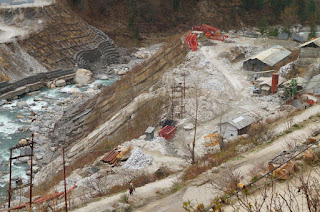It
has been long since I last visited the apple
capital of India, Himachal Pradesh. It was in last June that I had been for
an official trip for 15 days to incredible places in Kinnaur district including
the visit to Nako
village. My last visit was to the devbhoomi
when I trekked Auli, Deoriyataal and Chopta. Since, I was still in the rhythm
of trekking, I pondered over options ahead of me. Kheerganga appeared like a
challenging yet a viable option. I gathered company of three more, including my
younger brother, Akhil; my always eager to travel friend, Gaurav and another
companion from college, Paritosh.
It
being a 4-day extended vacation owing to Holi, Good Friday and then Saturday
& Sunday, we had realized that it was going to be crowded at the time we
reach Kheerganga. Thus we planned to start the trek as soon as we reach
Bershaini and visit the other places later while returning from the Kheerganga
trek. We boarded a bus from Kashmere gate, Delhi that would go till Manali but
would get down before Manali to Bhuntar. We started at 5:40 pm on 23rd
and reached Bhuntar the next day at around 6:30 am. Bhuntar is the place from
where one can go to the Kasol, Manikaran, and then to Bershaini, from where the
trek to Kheerganga begins.
The
bus from Bhuntar to Bershaini dropped us in Bershaini at around 10 am. We got
freshened up in a small room and had parathas at the restaurant owned by the same
guy who owned the rooms. At around 12 we were ready to leave for Kheerganga.
The restaurant owner was kind enough to let us keep our luggage beside luggage
of other trekkers. Paritosh still carried a heavy bag and Gaurav and Akhil carried
smaller ones. I was lucky enough just to carry my precious camera with me. And we
set out for the trek.
The
route is well laid out. Depending on the time of the year, you may find other
passionate trekkers. We also found many. The first impression of the valley,
however, was a disaster. Construction of a dam is defacing the verdant
surroundings. But once you cross the dam, the views of the trek are
captivating. Confluence of the Parvati River & the Tosh River to the left
and ponies feeding on grass to the right seemed picture perfect. A naked log
stood as high as I could see. The first leg began with a moderate ascend. It
goes on till Nakthan. Till Nakthan, most people reach comfortably. At Nakthan, there
are boarding and lodging arrangements as well as sufficient choice of food and
beverage. One can opt to refuel here.
As
you proceed, you are a spectator to the miscellany of nature’s color palette.
Landscape demonstrating hues of pink, green, blue, yellow, white, beige, brown is
quite common. The second leg of the
journey goes on till Rudranag. Rudranag is a sacred place with a small enclosed
waterfall of religious stature. There are no options to refuel here, but it
certainly is the place for rejuvenation. A rickety wooden bridge against the
backdrop of the fierce sound of gurgling emerald green waterfall cascading from
atop the mountains would catch you breathless. It is impossible not to halt at
Rudranag and ruminate over our toylike standing against nature.
Moving
ahead, there are limited options for food. And understandably as one goes
higher, the cost of food and drinks gets escalated, so it’s better to carry
something to munch on from below. I would suggest refilling the water bottles
from the running streams and waterfalls; as they are one of the purest forms of
water.
After
Rudranag starts the most onerous section of the trek. The trek through dense
forest awaits. Tall deodar trees don’t allow major portion of sunlight to creep
in the woods. The trek begins to get steeper. And you also start to get tired,
especially if you are burdened with bags. But this leg offers unparalleled beauty.
Lush appearance of flora around you is mesmerizing. The trees appear from an
ancient era. Some burnt, some fallen, and some with huge cavities; all telling
you different stories. Simultaneously, numerous voices of avifauna seek for
your attention. Recurring streams also announce their ubiquity. You have to get
going. We too did; stopping often to catch our breath and create a mind map of
the surrealistic beauty of nature we never get to see in our fast paced city lives.
You
feel a sense of strong achievement on reaching the top. The mountains now open
out into meadows where locals have pitched in large tented arrangements for
food and stay. You hike more towards the top and will get to see an ashram
which has further staying arrangements and just above it is the natural sulfur
hot water pool. It is truly a blessing after an arduous trek of nearly 15 km,
which took us nearly 4.5 hours.
We
hurriedly looked for a room at the top as many people had gathered on the top.
Luckily, we found one wherein somehow the four of us adjusted ourselves. We had
maggie at the restaurant and jumped into the pool to experience one of the most
restoring baths ever. The hot sulfur water is supposed to have medicinal
properties. It’s quite obvious. After such a heavy trek, the bath was magical.
It removed all pain and anxieties. We stayed in for nearly 40 minutes and came
out to have a despicable dish of rice and rajma. But we had something and
managed to sleep somehow for the rest of the night.
The
next morning, we left Kheerganga at around 8:30 in the morning and reached at
around 1 pm to Bershaini. We proceeded to Tosh and Manali the next two days. Succinctly
put, the whole trip was amazing. We trekked nearly 38 km spread over three
days. This trip surely made me stronger, both physically as well as mentally.







